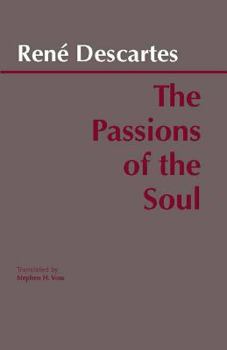Passions of the Soul
Select Format
Select Condition 
Book Overview
Dans cette oeuvre, Descartes se concentre sur la question des passions. Il s'agit donc d'un trait? de philosophie morale, le dernier domaine de la philosophie abord? par Descartes. Celui-ci s'inscrit,... This description may be from another edition of this product.
Format:Paperback
Language:English
ISBN:0872200353
ISBN13:9780872200357
Release Date:December 1989
Publisher:Hackett Publishing Company
Length:192 Pages
Weight:0.54 lbs.
Customer Reviews
2 ratings
A rationalist approach to controlling human passions
Published by Thriftbooks.com User , 14 years ago
I read Descartes The Passions of the Soul from the Philosophical Works Of Descartes, translated by John Cottingham, Robert Stoothhoff, Dugald Murdoch, for a graduate class in ethics. This is the best translation of several I examined. I was particularly interested in studying Descartes' understanding of the virtue of courage. It is fitting that Descartes left the discipline of moral philosophy as his last project, considering years earlier, in his Principles of Philosophy, he metaphorically explains the whole order of philosophy by using a tree as his example. "The roots are metaphysics, the trunk is physics, and the branches emerging from the trunk are all the other sciences, which may be reduced to three principal ones, namely medicine, mechanics and morals." (Principles of Philosophy, vol. 1 of The Philosophical Works Of Descartes, 186, (AT IXB, 14). Descartes' correspondence with Princess Elizabeth of Bohemia produces the first fruit of his ethical theory when she asked him questions about how the "passions" (emotions) are ruled by either the "soul" (mind) or the body considering they are separate entities. Descartes' answer to the Princess was, that the body causes the soul to have feelings and passions, and the soul causes the body to move, through an inexplicable `union' between the soul and the body. After a year of correspondence in which she received more than a few obtuse answers from Descartes, she asked him to provide a definition of the passions so that they could be easily understood. With this mission before him, Descartes in The Passions of the Soul published in 1649, makes a rational study of people's ethical behavior, relying on physiological as well as psychological explanations regarding the interplay between the body mind and emotive passionate forces that take place within people beings and cause their actions. In Descartes' first paragraph in his Passions, he challenges the wisdom of classical Greek notions of how people's passions influence ethics. "...the teachings of the ancients about the passions are so meager and for the most part so implausible that I cannot hope to approach the truth except by departing from the paths they have followed. That is why I shall be obliged to write just as if I were considering a topic that no one had dealt with before me." (The Passions of the Soul (AT XI, 327-328). Descartes divides his treatise on the Passions into three parts. Part I examines the mind and body relationship in physiological terminology, part II is a general classification of the passions and their functions, and part III makes a psychoanalytical study of individual passions. However, when one reads Descartes' ethical writing, one finds that he is not a tabula rasa. There is a Stoic influence to Descartes' ethical project the overriding aim of the Passions is to inform the reader on how to master the passions so that they will be an indispensable resource for the will in determining right action. I
Another Side of Descartes.
Published by Thriftbooks.com User , 24 years ago
If you have heard only one thing about Descartes, you have heard of his 'Cogito' - usually translated as "I think, therefore I am". In this book you will learn how important the human capacity to feel is for this philosopher. If you know only one thing about Descartes, you probably know that he was a metaphysical dualist. That is, he thought the universe is divided into two substances: mind and matter. On this picture mind, unlike matter, is not bound by the laws of physics nor it is even located in space. This metaphysical view faces a famous question. How does this non-material mind cause events in the physical body (like the raising of an arm)? In this book, you will learn that there is another, equally vexing question. How does a state in the body (say, the gut-wrench of fear) cause an event in the mind (the idea 'this is scary!'). This latter question has not received nearly enough attention. In the late 20th and early 21st centuries, it is quite common for philosophers to accuse Descartes of ignoring the visceral and emotional aspects of life and equating all thought with reason alone. In THE PASSIONS OF THE SOUL he belies this reading with the proclamation, "all the good and evil of this life depend on [the passions] alone". (Part III, Article 212)





